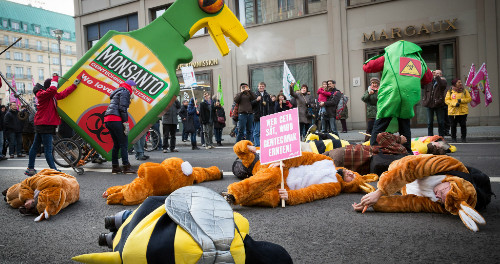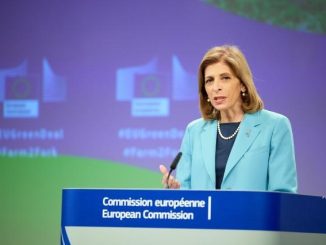BREAKING: adapted from Communique via European Parliament Press Service
Updated 18.30 CET
Given concerns about the carcinogenicity and endocrine disruptive properties of the herbicide glyphosate, used in many farm and garden applications, the EU Commission should renew its marketing approval for just 7 years, instead of 15, and for professional uses only, Parliament says in a resolution voted on Wednesday.

MEPs call for an independent review and the publication of all the scientific evidence that the European Food Safety Authority (EFSA) used to assess glyphosate. National experts sitting in the Standing Committee on Plants, Animals, Food and Feed (Phytopharmaceuticals Section) will vote to adopt or reject the Commission proposal by qualified majority in May. If there is no such majority, it will be up to the European Commission to decide.
The European Commission should renew the EU market approval for glyphosate for another 7 years only instead of 15 as originally proposed, says the non-binding resolution, which was passed by 374 votes to 225, with 102 abstentions.
Furthermore, the Commission should not approve any non-professional uses of glyphosate, say MEPs.
The Commission should also reassess its approval of glyphosate in the light of its pending classification by the European Chemicals Agency (ECHA), under separate legislation, they add.
The resolution calls on the Commission to table a new draft in order to better address the sustainable use of herbicides containing glyphosate and also to launch an independent review of the overall toxicity and classification of glyphosate, based not only on data relating to carcinogenicity but also on possible endocrine-disruptive properties.
Publish the scientific evidence
MEPs urge the Commission and the European Food Safety Authority to “immediately disclose all the scientific evidence that has been a basis for the positive classification of glyphosate and the proposed re-authorisation, given the overriding public interest in disclosure”.
Green burndown “unacceptable”
MEPs also condemn as “unacceptable” the use of glyphosate in a farming practice known as “green burndown”, i.e. the killing of the actual crop plant prior to harvest in order to accelerate ripening and facilitate harvesting. This practice leads inter alia to increased human exposure.
Glyphosate should not be approved for use in or close to public parks, public playgrounds and public gardens, they add.
Glyphosate is an active substance widely used in herbicides. Patented in the early 1970s, it was introduced to the consumer market in 1974 as a broad-spectrum herbicide and quickly became a best seller. Since its patent expired in 2000, glyphosate has been marketed by various companies and several hundred plant protection products containing glyphosate are currently registered in Europe for use on crops.
Click on the button to load the content from audiovisual.europarl.europa.eu.
Updated 18.30 CET below
After the vote, Green food safety and public health spokesperson Bart Staes said:
“The European Parliament has today highlighted serious concerns with the proposal to re-approve glyphosate for use in Europe and the Commission and EU governments must take note. We would have preferred if MEPs had followed the recommendation of the EP’s environment committee in clearly calling for an outright rejection of the re-approval of glyphosate. However, this resolution opposes approval of glyphosate for most of its uses, and takes aim at the excessive length of the approval proposed by the Commission. This is a shot across the bow of the Commission and it must now work with EU governments to address these concerns, rather than pushing ahead with its proposed reapproval.
“There is growing opposition among EU governments to reapproving glyphosate for use in the EU and we hope today’s vote, combined with major public opposition, will convince more governments to change their minds on glyphosate. Given the serious health and environmental concerns and conflicting scientific advice regarding glyphosate, it is scandalous that the EU Commission proposed to continue to allow its use for 15 more years, without any restrictions on its use. With the WHO assessment having concluded the substance is probably carcinogenic. EU governments must heed these concerns and reject the Commission’s proposal.”
Further information
Procedure: Non-legislative resolution
Adopted text available here (click on 12.04.2016)
Video recording of debate (click on 11.04.2016)
EP research: renewing authorisation for glyphosate
International Agency for Research on Cancer (IARC / WHO) study
European Food Safety Authority (EFSA) risk assessment
Video: extracts from the vote on renewal of the approval of the active substance glyphosate
More





1 Trackback / Pingback
Comments are closed.